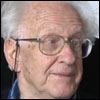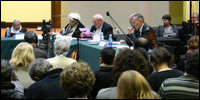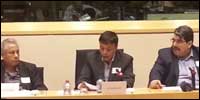|
|
1235 matching reports found. Showing 61 - 80 [TamilNet, Sunday, 06 April 2014, 11:37 GMT] “Let us say you have one million Tamils in the Tamil diaspora. They used to collect money for the LTTE. They collected a lot of money. Let me put it in very plain simple terms: these one million work on the media of the world and make the story better known,” said 84-year old Peace Studies Professor Johan Galtung, in an interview to TamilNet-Palaka'ni last month. Acknowledging that the Eezham Tamils face genocide and structural genocide, identifying the Mahavamsa mentality in the Sinhala-Buddhists as the impediment for solutions, and at the same time blaming the armed struggle of the LTTE as a mistake, Galtung stood by “federation with a high level of autonomy,” which he had advocated and failed during his 34 visits to the island at the time of the peace talks. Full story >> [TamilNet, Thursday, 27 March 2014, 16:48 GMT]The resolution on Sri Lanka framed by the United States and the UK with the backing of 36 other Member States of the United Nations, passed with 23 of 47 Member States of the United Nations Human Rights Council (UNHRC) voting for the resolution, 12 voting against and 12 abstaining. The resolution has failed to call for a full fledged independent international investigations and to propose an international mechanism to put an end to the ongoing genocide against the nation of Eelam Tamils. India and Japan have abstained from voting. Pakistan and Maldives voted against and South Korea voted for the US proposed resolution. Full story >> [TamilNet, Wednesday, 26 March 2014, 03:18 GMT]While noting that "“investigation” by the UNHCR is better than nothing—with all due and sincere respect for the UNHCR," Professor Boyle, an expert in international law, said, dissemination of that “investigation” will be subject to the control of the UN Human Rights Council for political reasons and the dissemination of that UNHCR “investigation” will be dragged out for as long as possible by the Human Rights Council, thus enabling the GOSL to continue its campaign of ongoing genocide against the Tamils despite the requirement of article 1 of the Genocide Convention that every UN Human Rights Council state member is obligated both “to prevent and to punish” the GOSL genocide against the Tamils," Boyle said.
Full story >> [TamilNet, Monday, 24 February 2014, 07:58 GMT]It was a big mistake for the EU to ban the LTTE. There was pressure from the USA and the Sri Lankan government, said Major General Ulf Henricsson, who was heading the Sri Lanka Monitoring Mission (SLMM) in 2006. “I would say that was a big mistake, because it stopped the possibility to get a peaceful solution and negotiation,” Henricsson told TamilNet in an interview in Sweden on Saturday. Acting on solutions now, compared to Bosnia, he cited lack of interest in the West. He was stressing on the importance of India in acting on the question, but said that India is not interested in getting engaged. China and India and other countries are not interested in having the international community on that territory, he added. Full story >> [TamilNet, Wednesday, 05 February 2014, 07:29 GMT] Second-generation Tamil youth activists gathered outside the Sri Lankan embassy in London on the occasion of the 66th ‘independence day of Sri Lanka and burnt copies of the Sri Lankan constitution to assert that the unitary structure of GoSL has only genocidal connotations for the Tamils. The youth activists also condemned Britain’s historical role in buttressing the SL state and denying Tamils’ their sovereignty. Full story >> [TamilNet, Tuesday, 04 February 2014, 09:17 GMT]Noting how the UK-USA governments helped the GoSL during the genocidal war on the Eezham Tamil nation owing to geopolitical interests, former UN Assistant Secretary-General Dr. Denis Halliday said that “as long as they don’t stop the genocide and block the land grabs, and help us to turn it around, they are still complicit in my book.” In an exclusive interview to TamilNet, Dr. Halliday, who was also one of the judges at the Bremen-PPT, condemned Britain’s historical role in “creating a problem” that is the unitary state of Sri Lanka noting that “there was no reason, no justification, to conclude that you need a unitary state.”He also emphasised that Britain should relook its neo-colonial policies and own responsibility for the Tamils soon. “This genocide is going to destroy Tamil Eelam if we do not stop it soon,” he said. Full story >> [TamilNet, Monday, 03 February 2014, 10:14 GMT]"Everyone must redouble their pressure on the Obama administration directly at the White House and the Cameron government directly at No. 10 Downing Street in order to get that international commission of investigation at the UNHCR in March. With elections coming up in India, everyone must redouble their pressure on the Tamil Nadu government to get them to pressure the Indian government to support that international commission of investigation at the UNHRC in March. The one hope we have is that the GOSL continues to be so obstinate, stubborn, pig-headed and genocidal that they will do nothing," said Professor Boyle, an expert in International law and a keen observer of Sri Lanka's genocidal politics said in a comment sent to TamilNet. Full story >> [TamilNet, Sunday, 02 February 2014, 10:50 GMT] Academics, legal experts, activists, journalists, and Eezham Tamil politicians gathered in London to discuss Sri Lankan state facilitated land grabs in the Eezham Tamils homeland, its nature, its effects, and possible solutions, at a conference on Saturday. While all of the presenters were in consensus that land grabs in the Tamil homeland was a phenomena that was a genuine and pressing issue, many expressed their support for a strong international campaign to put a halt to this. Likewise, some of the participants also criticised the international community’s silence and complicity in the process. There was also heated debate on whether the process could be termed “genocide”, with former UN official and Bremen-PPT judge Dr. Denis Halliday along with Tamil activists from both the presenters and the audience arguing in its favour. Full story >> [TamilNet, Monday, 20 January 2014, 00:05 GMT] Commenting on the Genocide Discussion held at the United Nations on the 15th January, where the Deputy Secretary-General Jan Eliasson discussed strategies to heed to early warning of mass atrocities, Professor Boyle, an expert in International Law, said, "[w]hat is needed now is for the United Nations to establish an outside Independent Commission of Investigation of distinguished experts along the lines of the Rwanda Commission with a mandate to investigate the entirety of GOSL atrocities against the Tamils. Only then might the United Nations atone for its Mortal Sins against the Tamils." The U.N., which withheld information on Sri Lanka's killings, and refused to take up Sri Lanka in the Security Council during the Mu'l'livaaykkaal killings, continued to avoid mentioning Sri Lanka, even while it touted "Rights Up Front" doctrine modeled after Sri Lanka massacres. Full story >> [TamilNet, Monday, 06 January 2014, 00:50 GMT] US Ambassador for Global Criminal Justice Stephen Rapp will spend five days in Sri Lanka meeting with government, political and civil society officials "on a range of issues focusing on Sri Lanka's justice, accountability, and reconciliation processes," the US State Department said. While Rapp was previously holding the title Ambassador-at-large for War Crimes Issues, Rapp's office released a damaging "Report to Congress on Incidents During the Recent Conflict in Sri Lanka," to US Congress as required by the US Supplemental Appropriations Act of 2009. Also, in July 2010, US and UK representatives of Tamil diaspora groups briefed Ambassador Stephen Rapp, and his staff on the historical context of the Tamil struggle, and submitted supporting evidence and affidavits on war-crimes and crimes against humanity committed by the Sri Lankan State on Eezham Tamils in the island of Sri Lanka. Full story >> [TamilNet, Monday, 23 December 2013, 19:45 GMT] "Based upon my first-hand personal experiences working with the Palestinians at their peace negotiations and the Bosnians at their peace negotiations, the Tamils cannot trust the United States, the United Kingdom, the United Nations, the European Union and its Member States to do the right thing for them. The Tamils can only trust in themselves,” responded Professor Francis Boyle on Monday, when TamilNet asked him what would be his advice to the Tamil diaspora in engaging with the ‘International Community’. TamilNet posed the question to Professor Boyle following his recent interview on Bosnian ‘peace’ negotiations to the Institute for Research of Genocide, Canada.
Full story >> [TamilNet, Sunday, 08 December 2013, 17:54 GMT] Establishing a Truth and Reconciliation Commission (TRC) modeled on the South Africa (SA) experience, viewed by Sri Lanka backers as an urgent need to mitigate possible strong actions by the International Community against Sri Lanka over its rights violations, appears as an imminent outcome from the recently concluded Commonwealth Meeting [CHOGM]. But a Sri Lanka journalist who is a visiting Australian National University fellow, says whereas in the post-apartheid South Africa context and under the leadership of Mandela, TRC was made to work in SA, in Sri Lanka proposing a TRC without defining what it means, makes the effort appear only as "another procrastinating tactic." The scholar cautions, in Sri Lanka, no credible investigations into rights violations are likely to happen, and the consequences for Sri Lanka, in terms of being outlawed from the community of nations, are dire. Full story >> [TamilNet, Sunday, 08 December 2013, 01:29 GMT] During the Second Session of the Peoples’ Tribunal on Sri Lanka which opened Saturday in Bremen, Germany, a panel of eleven eminent judges heard the "Prosecution outline its case that the crime of genocide has been and is being committed against the Tamil people in Sri Lanka," the press release issued by the sponsoring organizations, Permanent Peoples Tribunal (PPT) and Internationaler Menschenrechtsverein Bremen e.V. said. Eleven direct witnesses gave evidence to the panel during the first day. The judges, many of whom are legal scholars on genocide, will apply the principles enshrined in the 1948 Genocide Convention to the evidence presented, and announce their legal determination this Tuesday, December 10th. Full story >> [TamilNet, Saturday, 07 December 2013, 19:42 GMT] African leaders are raising concern over the actions of the 11-year old court of last resort, the International Criminial Court (ICC), where the eight cases that are currently active and the twenty-one defendents are all from Africa, Washington Post reported Sunday. The article quoted Richard Dicker from Human Rights Watch who countered Africa's arguments saying that African nations cannot deny redress to victims (in Darfur or Kenya) just because it is not possible to provide victims in Sri Lanka justice, implying that while ICC has failed to go after war-criminals in Sri Lanka even after the UN's Petrie Report has accused Sri Lanka of killing more than 70,000 Tamil civilians in the no-fire zone, this is not sufficient to deny african victims redress through the Court. Full story >> [TamilNet, Monday, 02 December 2013, 23:51 GMT] The Permanent Peoples Tribunal (PPT) in Rome has announced the names of 11 judges, who would be hearing the long-awaited case on the accusation of genocide against Eezham Tamils to be heard by an independent panel. “Like in the first session, a respected panel of judges consisting of experts in Genocide studies, former UN-officials, experts in international law and renowned peace and human rights activists will hear the evidence that is presented and make a determination,” a press statement signed by Mr Gianni Tognoni, the secretary general of the PPT, stated. The first session held in January 2010, known as the Dublin Tribunal, was the first independent international undertaking that recognised the need to look into the case of genocide in the island of Sri Lanka. The second session is to take place between December 07 -10, 2013 in Bremen, Germany. Full story >> [TamilNet, Monday, 30 September 2013, 18:07 GMT] How do we save national struggles from decimation and structure these struggles as people-centric? This is the uppermost question we have to address in right earnest, observed, Mr Saba Navalan, the editor of inioru.com in the UK, in reading a paper on Sri Lanka’s case study in the 21st century’s movements for self-determination, at an EU-level conference convened by IBON International that took place in the European Parliament last Monday. According to Mr Navalan’s observations, an obstacle in the realization of self-determination is that the upper layer of each ethnic group is held by pro-imperial forces and despite having fundamental contradiction, the upper middle class, in the absence of national capitalism, is comfortable about its association with the pro-imperial class. Full story >> [TamilNet, Friday, 27 September 2013, 23:43 GMT] Arguing that the Northern Provincial Council elections was not conducted for the interests of the Eezham Tamil nation but rather was coordinated by the US-Indian establishments for diverting the attention of the world from the genocide taking place, Umar, activist with the May 17 Movement, stated that the vote of the Eezham Tamils for the TNA was cast against the genocidal Sri Lankan state. Without considering this, some are interpreting the vote as being against the demand of Tamil Eelam and a legitimation of unitary Sri Lanka. In an interview to TamilNet, he further said a political solution can be arrived at only through a referendum amongst the Eezham Tamils in the island, in Tamil Nadu and the diaspora, referring to the overwhelming mandate for the Vaddukkoaddai resolution given by the diaspora in 2010. Full story >> [TamilNet, Thursday, 19 September 2013, 10:58 GMT]While Sri Lanka's President Mahinda Rajapaksa, who bears command responsibility for the killing of nearly UN-estimated 100,000 Tamil civilians by the Sri Lanka military, is attending the 62nd United Nations General Assembly, commencing on September 25, the White House is not commenting on if the US would be issuing an entry visa to alleged war-criminal and Sudan's long time leader Hassan al-Bashir to attend the UN annual meeting. Recently, the US State Department, using its discretionary powers, intervened to save Rajapakse from war-crimes charges in Court cases filed by affected Tamils. Full story >> [TamilNet, Saturday, 31 August 2013, 21:09 GMT]“I was concerned to hear about the degree to which the military appears to be putting down roots and becoming involved in what should be civilian activities, for instance education, agriculture and even tourism,” Ms Navi Pillay, UN High Commissioner for Human Rights, said at a press conference in Colombo on Saturday. Speaking at the conclusion of her visit to the island, Ms Pillay said that that the military presence in the North-East seemed “much greater than is needed for strictly military or reconstruction purposes,” also referring to the vulnerability of women to sexual abuse. While sympathizing with the spirit of the address of Ms Pillay, who has been at the receiving end of vulgar verbal abuse from Sinhala nationalists, Tamil activists in the island expressed regret that she was still conferring legitimacy to the GoSL’s genocidal blueprint called LLRC. Full story >> [TamilNet, Saturday, 27 July 2013, 18:51 GMT]Commenting on Prime Minister Dr Manmohan Singh's statement that India has “long advocated the creation of an environment in Sri Lanka in which all communities, particularly the Sri Lankan Tamils, are masters of their own destiny within the framework of a united Sri Lanka,” Professor Boyle, an expert in International law, said that this was not an appropriate remedy to deal with genocidaires, adding, "It would be like asking the Jews to engage in a Truth and Reconciliation Process with the Nazis. The very idea is absurd and insulting upon its face alone." India's Prime Minister was responding to Chief Minister Jayalalithaa statement urging the Center to ensure that the process of democratic decentralization, integral to the survival of the Tamils in Sri Lanka, should lead to the Tamils realising their legitimate aspirations. Full story >>
|
|


















